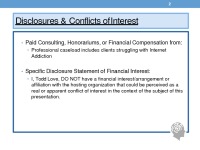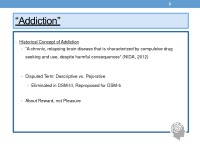Internet And Gaming Addiction



Disclosures & Conflicts of Interest. “Addiction”. Behavioral Addiction. Tolerance and Withdrawal. Other Addictive Behaviors. Dsm. DSM-5 proposed changes. DSM-5 Outcomes. Addictive Behaviors in the ICD. Internet-Related Addictions. Dopamine and the Internet. Information Overload – Classical Conditioning. Special Considerations Adolescents. Internet Addiction. Internet Addiction (Problematic Internet UseInternet Addiction / PIU Assessment Tools. Internet Addiction Test– Short Version (sIATInternet Gaming Disorder (IGDGaming Disorder and the ICD-11 (Beta DraftIGD – DSM-5 Diagnostic Criteria. Internet Gaming Disorder Assessment Tools. Internet Gaming Disorder Test IGDT. I-pace model. Internet Gaming Disorder Treatment. Treatment cbt-ia. Inpatient/Residential Options. IGD Differential Diagnosis – not always a “Disorder”. E-Sports. Therapeutic Use of Video Games & “Digital Medicine”. Parenting Tips for the Digital Age. Thanks for your attention.
Paid Consulting, Honorariums, or Financial Compensation from: Professional caseload includes clients struggling with Internet Addiction Specific Disclosure Statement of Financial Interest: I, Todd Love, DO NOT have a financial interest/arrangement or affiliation with the hosting organization that could be perceived as a real or apparent conflict of interest in the context of the subject of this presentation.
Historical Concept of Addiction “A chronic, relapsing brain disease that is characterized by compulsive drug seeking and use, despite harmful consequences" (NIDA, 2012) Disputed Term: Descriptive vs. Pejorative Eliminated in DSM-III, Reproposed for DSM-5 About Reward, not Pleasure.
Not a new concept: Orford (1985) “Excessive Appetites” – gambling, eating, sex Marlatt, Baer, Donovan, & Kivlahan (1988) “Addictive behaviors” Multiple overlaps b/t behavioral addictions and chemical addictions: Comorbidity, course, genetic contribution, neurobiology, phenomenology (craving, intoxication, withdrawal), tolerance, and treatment response (Grant, Potenza, Weinstein, & Gorelick, 2010; Leeman & Potenza, 2013) (more...).
A primary, chronic disease of brain reward, motivation, memory and related circuitry...This is reflected in an individual pathologically pursuing reward and/or relief by substance use and other behaviors. (ASAM, 2011) “Addiction to ... Drugs/Games/Gambling/Porn/Sex/etc”.
Tolerance results from a homeostatic adaptation to chronic increased levels of dopamine in the Reward Center (potentially caused by alcohol, gambling, gaming, porn, sex, etc.
- Psichology Presentations
- MS PowerPoint 1337 KB
- 2020 m.
- English
- 37 pages (1880 words)
- College
- Nojus

















